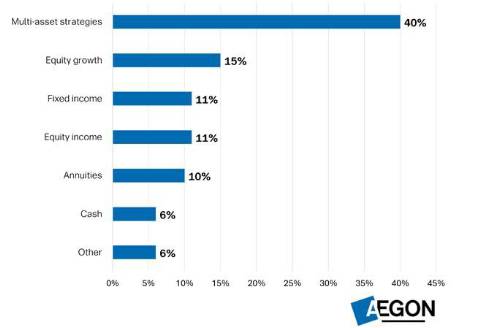Collating the views of 200 financial advisers from across the UK, Aegon’s latest Adviser attitudes report shows how investment advice is adapting to meet the changing behaviours and plans of retiring clients.
The research finds that 31% of advisers say their clients are choosing to retire later than they had initially planned. When asked to identify the challenges faced by their retiring clients, advisers subsequently indicated that running out of money in retirement was the number one fear (77% of advisers). Difficulty when planning how much income they may need in retirement was second amongst common concerns, with 63% of advisers saying their clients felt this way.
In terms of investment strategy, advisers say that 40% of their retiring clients’ pension assets are invested in multi-asset strategies – the most popular investment strategy by a considerable margin. Equity growth was the second-most popular strategy, with 15% of retiring clients’ pension assets. This was followed by equity income and fixed income, both at 11% of retiring clients’ pension assets.
Despite favourable rates and the stability they can offer in a challenging economic environment, only 10% of retired clients’ pension assets are invested in annuities – the fifth most popular option.

Data source: Adviser attitudes report, Aegon UK, August 2024. Question: What proportion of your retiring clients’ pension assets are invested in the following types of strategy?
Lorna Blyth, Managing Director, Investment Proposition, comments on the findings: “Given the economic challenges of the past few years, more people taking the decision to earn for longer and retire later shouldn’t come as a huge surprise. However, as we’ll explore in more detail in the upcoming second edition of our Second 50 report, it’s important that both clients and advisers recognise that stopping work at a later date, but living longer on average, doesn’t necessarily mean fewer years of retirement to fund and plan for.
“When it comes to building pension assets, the flexibility and risk-rated options afforded by multi-asset strategies could be incredibly valuable for a growing number of clients who are adopting new patterns of work and retirement. It’s understandable that advisers continue to make use of them in the best interests of their clients, despite annuities becoming more attractive during the recent economic challenges.”
|

